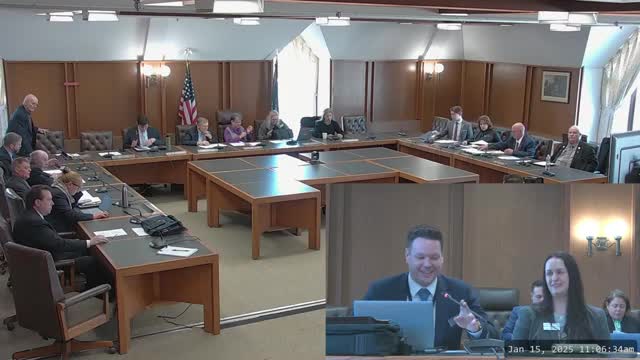Legislative staff briefs EDNA on administrative rulemaking, JELCAR review and limits on agency authority
Get AI-powered insights, summaries, and transcripts
Subscribe
Summary
Office of Legislative Services staff gave EDNA members a one-hour orientation on administrative rulemaking, explaining rule definitions, limits on delegated authority, the JELCAR review role and practical steps committees and agencies should take during drafting and notice.
Representative Carol McGuire, chair of the House Executive Departments and Administration Committee, opened the committee’s orientation by introducing staff from the Office of Legislative Services and inviting a presentation on administrative rulemaking.
“Ours is the Office of Legislative Services. My name is Douglas Osterhau. I am the director of the Administrative Rules Unit for the Office of Legislative Services,” said Douglas Osterhau, the unit’s director, who led the briefing along with committee attorney Rebecca Ricard.
The presentation defined a rule and stressed its legal weight. “A rule is any regulation standard. It’s a statement of general applicability, meant to implement, interpret, or make specific a statute that prescribes or interprets agency policy or practice,” Osterhau said, summarizing the Administrative Procedure Act framework and noting that properly adopted rules “carry the force of law.” He and Ricard described the statutory reference (RSA 541‑A) that governs the rulemaking process and the Joint Legislative Committee on Administrative Rules (JELCAR) role in reviewing proposed rules.
Why it matters: committee members were told that the legislature often delegates authority to agencies to implement statutes, but that delegation is limited. OLS staff highlighted recurring problems agencies and committees face: insufficiently specific statutory language, rules that exceed agency authority, rules that impose unfunded mandates on municipalities, and lapses in notice or publication. Representative McGuire added a practical enforcement point: “Normal rules expire in 10 years, and an expired rule cannot be enforced.”
Key mechanics and practice recommendations explained to members: - Agencies must cite the specific statutory authority and the statute(s) the rule intends to implement when submitting an initial proposal; OLS reviews notices and will return ones that lack required information before they go into the register. - Agencies file an initial proposal with OLS and the LBA fiscal impact; they must hold a public hearing and may change the rule based on testimony before issuing a final proposal to JELCAR. - JELCAR may approve, object to, or ask the legislature to change a proposed rule; a JELCAR objection shifts the burden so an agency adopting over objection must defend the rule’s validity in court. - Agencies may not delegate their rulemaking authority to another agency or create rules outside the statutory grant; some rule types (for example, setting penalties, creating licensing categories, or requiring nonconsensual inspections) typically need explicit statutory authorization. - Municipal impacts: administrative rules cannot impose unfunded mandates on political subdivisions; agencies must attest to the fiscal effects on municipalities.
Practical advice for legislators: staff urged committee members to review the Rulemaking Register when an initial proposal is published and to solicit subject‑matter expertise early. OLS recommended pre‑notice outreach by agencies as a way to avoid later conflict. Committee members and staff were told they could consult OLS while drafting bills that include delegation language so the statutory language is tight and avoids unintended grant of authority.
Several committee members asked procedural questions about interim/emergency rules, the scope of JELCAR review and exceptions for municipal consent under the state law cited as "28‑A" in testimony. OLS staff said interim rules are short‑term fixes (typically 180 days) and described the limited statutory categories that allow interim action.
The orientation closed with OLS staff offering follow‑up help to members drafting bills that include rulemaking authority: “You can always consult with them if you’re writing a bill or working on a bill with rulemaking authority. They will be very glad to help you,” Osterhau said.
Ending: the committee scheduled other briefings and subcommittee work; members were urged to consult OLS early in the drafting process and to monitor the rulemaking register to protect legislative intent and municipal budgets.
